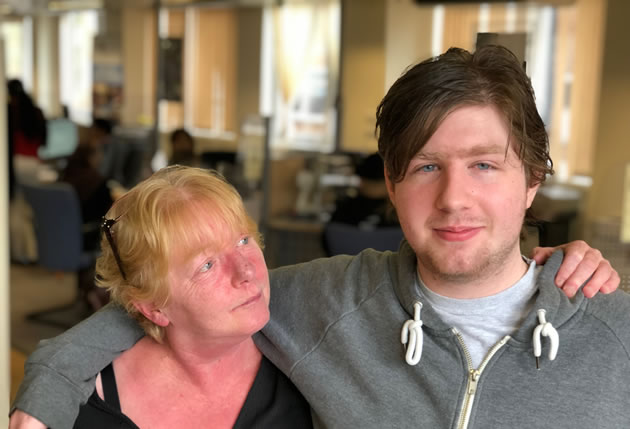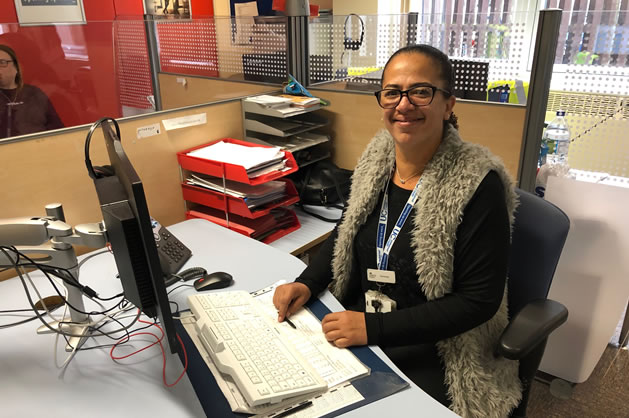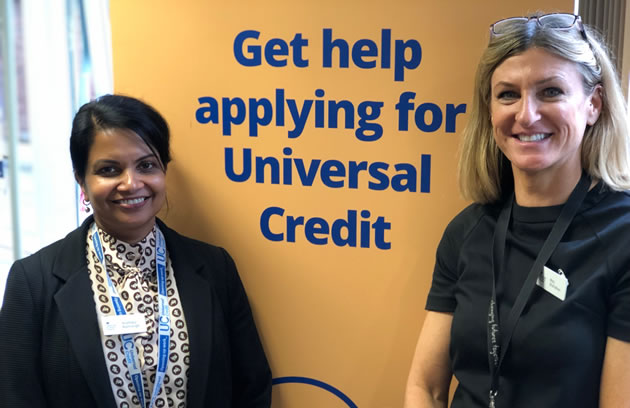How is Universal Credit Working for People in Ealing?
Mixed views expressed on controversial new benefits system

Gareth Butler with his mother. Picture: Ged Cann
One Universal Credit recipient in Ealing claims the new benefit system left him almost £900 in debt and reliant on food banks to survive.
Another is overjoyed with it, saying it took him from spending all day in his room to landing his first job, and that he is able to understand the system despite being dyslexic.
Universal Credit (UC) is the government’s ambitious plan to wrap the likes of job seekers allowance, incapacity benefits, transport allowance, income support, and housing benefits into one system.
But what is being on the new benefits system really like, what are the advantages and disadvantages, and how are staff finding the transition?
The Local Democracy Service talked to two recipients about their experiences, and went into the Ealing Job Centre to see how staff on the ground find the new system.
Mr Brasil transitioned onto UC in September last year, and was hit immediately with a rule that often gets complaints – the five week stand-down.
This rule means that as standard, when someone joins Universal Credit, they do not receive any benefits for the first five weeks.
 Christopher Brasil. Picture: Ged Cann
Christopher Brasil. Picture: Ged Cann
According to Prathiba Ramsingh, who is responsible for running 13 Job Centres around West London, this is intended to allow new recipients to prepare their new budgeting.
She said budgeting support was offered during this period as well as alternative payment arrangements and UC advances to support those who need it.
For Mr Brasil, who is unable to work due to a disability including hearing loss and epilepsy, five weeks without benefits could see him on the street.
So he, like many others, applies for an advance, which he would then have to pay back in instalments from his normal payments.
Data from the Department of Work and Pensions showed Mr Brasil requested a new claim advance of £500 in August 2018, which is currently being repaid at £41.67 per month.
He also received a Budgeting advance in January this year of £348. The repayments on this advance was deferred until October 5.
Unfortunately, Mr Brasil said his first UC payment came as a lump sum, rather than being divided up, with the likes of his accommodation allowance going straight to his landlord.
Mr Brasil said: “It’s very tempting to use that money for other things rather than paying for rent.”
He admits to spending some of the benefit on new clothes and a laptop, which he said he needed in order to use UC’s new online journal function.
Because of his missed rent payment, he said he had received court summonses and relied on discretionary housing payments.
With deductions now being made for both UC advances and others being made to outstanding and unrelated court fines, Mr Brasil’s take-home monthly benefit fluctuates around the £200 mark.
He said: “As far as I’m concerned it’s below the standard of living. I’m trying to run a house with all the household bills, and clothe myself and feed myself.
“Under ESA (The Employment and Support Allowance) I was paid fortnightly, but because of Universal Credit, for some unknown reason, you’re paid monthly. That’s immediately a struggle.”
Mr Brasil now says he goes to soup kitchens almost every night of the week to make ends meet.
He said: “It’s extremely humiliating and embarrassing.”
A Department for Work and Pensions spokesperson said: “Mr Brasil has deductions from his account for two advance payments, which he requested, as well as court fines. We have paused one of his advance payments to assist him but he would need to speak to the court regarding his fine.”
Mr Butler’s experience of Universal Credit couldn’t be more different.
Despite suffering from dyslexia and dyspraxia – a developmental coordination disorder – he says the new all-in-one system is easy to understand, and straightforward to navigate.
He said it took him from being someone without a future, to someone about to start their first ever job.
Before going onto Universal Credit in January, Mr Butler said he spent almost every hour of the day in his room.
He remembers the first time he walked into Ealing’s Job Center, sporting a “big beard and long hair”, and without the confidence to talk to anyone.
He said: “When I first came here I had a big job understanding it, and it was a job going from computer to computer to figure it out, but I got a lot of help figuring that out, and I don’t really struggle now.”
“It’s been great, I got set up with a programme that’s got me a job now with M and S (Marks and Spencer).”
He gained the job after being referred to a supported internship programme through Redwood College in March.
Gareth’s mum, Mairead Mooney, reacts with emotion when she’s asked about what Universal Credit has done for her son.
She said: “It’s been a huge transformation in Gareth… The first time Gareth came here I came with him. One of the happiest moments of my life was his third appointment, and he turned around and said ‘no mum, I’ll go by myself’.”
Gareth gets an accommodation allowance, and receives roughly £250 a month to support himself – a figure that will go up when he reaches 25, if he still needs it.
The Local Democracy Service went to Ealing’s Job Centre to talk to staff about how the transition has gone.
Tobias Cordingley and Tammie Spooner are both employed as work coaches. Mr Cordingley said the transition had been very smooth.
“I’m not going to say it hasn’t had problems, but that’s the whole point of Universal Credit, it’s agile,” he said.
Mr Cordingley said he had, in the past, submitted feedback for improvements to the system, and seen them acted upon.
He said: “One of the biggest concerns we hear is ‘why have you gone digital?’. Well, we have to go digital at some point.
“We have digital learning, we can show them, but also at the moment we have phone claims for anyone not quite ready to go digital.”
 Tobias Cordingley. Picture: Ged Cann
Tobias Cordingley. Picture: Ged Cann
Ms Spooner said the old Job Seekers Allowance system was very rigid and put everyone into one box.
The new system, she says, is tailored to the individual, shaped by things like how many children that person might have, or any disability.
 Tammie Spooner. Picture: Ged Cann
Tammie Spooner. Picture: Ged Cann
Maggie Carey is a disability employment adviser – one of three working at the Ealing site.
Her job is to help provide specialist support for anyone with a disability (physical or mental) that might come in.
She said: “A lot of them don’t realise there are things out there that can support them.
“There’s something called Access To Work that our department funds which helps make reasonable adjustments in the workplace for those with disabilities. We also have access to work psychologists.”
Customer service operations manager Marj Shanahan said the media had portrayed Universal Credit negatively, creating reservations for some recipients.
She said: “We’ve tried really hard to change that reputation, because there are some customers who we know did not want to claim Universal Credit, and that’s created hardship.”
She said rolling all the old benefits systems into one had been a boon.
“We have one system, one service, we are more joined up with our service centres. So from a customer’s point of view they receive a better service because it’s so joined up.”
“Before, if we couldn’t deal with a query, we would pass them onto another section of the department.”
Service leader Prathiba Ramsingh runs 13 job centres in West London, and said in her 30 years on the job and having seen multiple transitions, Universal Credit was the best service the organisation had delivered.
“That’s my absolute, personal, firm view,” she said.
Ms Ramsingh said the end of the 16-hour rule was also a big advantage to Universal Credit.
“In the old system if you worked 16 hours that was it, the benefit stopped.”
“It wasn’t an incentive for someone to work more hours, to earn more, and to become self-sufficient. That went with Universal Credit.”
 Service leader Prathiba Ramsingh and customer service operations manager Marj Shanahan. Picture: Ged Cann
Service leader Prathiba Ramsingh and customer service operations manager Marj Shanahan. Picture: Ged Cann
Under the old system, she said Job Centre staff were aware of clients asking their employers not to give them more than 16 hours work a week.
“We knew people were saying to their employers ‘don’t give me more than 16 hours’.”
Andrew Mcleay runs Ealing Soup Kitchen, and he said many of his guests are confused by Universal Credit.
He said: “Many elderly and frail people have very little understanding of computers, let alone using and logging onto the UC system.”
“It takes us hours to show them what they need to do. They have trouble remembering the three questions they need to enter, they don’t understand why they need to ‘upload’ things like sick notes when they can show them to staff at the job centre.
“Many of them complain it’s depressing they can’t actually speak to people.”
Mr Mcleay also said many homeless didn’t have smartphones or a laptop and libraries around Ealing were closing, making access to the online journal difficult for some.
Ged Cann - Local Democracy Reporter
October 17, 2019